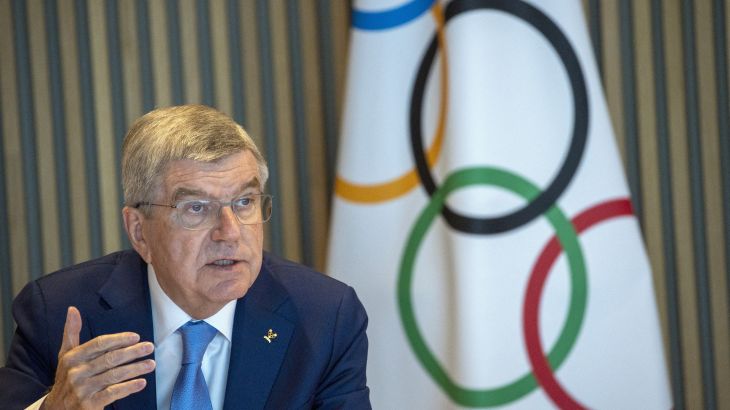IOC recommends return of Russian, Belarusian athletes as neutrals
The Olympic committee has recommended that Russians and Belarusians be allowed to compete as neutrals amid an ongoing ban in response to Moscow’s invasion of Ukraine.

The International Olympic Committee (IOC) has recommended the return of Russian and Belarusian athletes to international sporting events as neutrals, after they were banned from competitions in the wake of Russia’s invasion of Ukraine last year.
The IOC said on Tuesday that its advice to the governing bodies of Olympic sport does not concern the participation of athletes and their support staff at the Olympic Games Paris 2024 or the Olympic Winter Games Milano Cortina 2026.
Keep reading
list of 3 itemsRussia-Ukraine war: List of key events, day 398
Russia-Ukraine war exposed human rights ‘double standards’
“The IOC will take this decision at the appropriate time at its full discretion,” said President Thomas Bach, adding “we are not kicking it down the road,” when asked if the committee was effectively buying time for the war to end.
Athletes from Russia and Belarus were banned from competing in international sporting events following the full-scale invasion of Ukraine by neighbouring Russia in February 2022. Belarus was also used as a key staging area for Russia’s invasion.
However, an Olympic summit on December 9 opened the door for the return of these athletes to events despite the continuing war.
‘Condemnation of the Russian invasion’
Ukraine has threatened a Paris boycott and sport politicians from more than 30 countries opposed a return of the athletes from the two countries.
On Tuesday, Bach recommended to international federations and international sporting event organisers that “athletes with a Russian or a Belarusian passport must compete only as Individual Neutral Athletes”.
These athletes should wear uniforms that are either entirely white or a single colour, and cannot have a team logo. Athletes should be barred from displaying their national flags on social media or making statements “that may be prejudicial to the interests of the competition, its integrity or the participant’s neutrality”, the IOC’s document stated.
Athletes from the two countries who have actively supported the war in Ukraine, or are “contracted to the military or national security agencies”, should not be cleared to compete as neutral individuals, Bach said.
The Russian defence ministry has said more than 20 of the country’s medalists at the Tokyo Olympics staged in 2021 held military ranks. Of the 71 medals won in Japan, 45 were by athletes affiliated with the Central Sports Club of the Army.
Bach reiterated the IOC’s “condemnation of the Russian invasion of Ukraine, which is a blatant violation of the Olympic Truce that was in effect at the time, and of the Olympic Charter”.
In its recommendations, the IOC also said that “teams of athletes with a Russian or Belarusian passport cannot be considered”, and clarified that the sanctions against “those responsible for the war, the Russian and Belarusian states and governments”, must remain in place.
‘Unacceptable’
Russia and Belarus remain unable to organise international sporting events on their territory, and no flag, anthem or any other identifications of these countries can be displayed at a sporting event or meeting.
Additionally, “no Russian and Belarusian government or state official can be invited to or accredited for any international sports event”, the IOC said.
The head of Russia’s Olympic Committee said that criteria recommended by the IOC were “unacceptable”.
“This is discrimination on the basis of nationality,” Stanislav Pozdnyakov said as quoted by Russian news agencies.
Poland slammed the IOC’s recommendation, calling it a “day of shame”.
“What positive things has Russia done for their athletes to now take part in competitions!! After Bucha, Irpin, Hostomel!! After the daily bombings of civilian sites!! It’s a day of shame for the IOC!!” Deputy Foreign Minister Piotr Wawrzyk said on Twitter.
The comments came days after World Athletics voted to lift an eight-year doping ban on Russia.
The Russian Athletics Federation was banned in 2015 after the discovery of massive, state-sponsored doping and cover-ups. A failure to meaningfully address the issue meant that the suspension remained in place for eight years.